This article was co-authored by Alexandra Janelli. Alexandra Janelli is a Certified Hypnotherapist, Anxiety & Stress Management Coach, and owner and founder of Modrn Sanctuary, a holistic health and wellness facility in Philadelphia, Pennsylvania. With over 10 years of experience, Alexandra specializes in helping clients push through their roadblocks to achieve their goals using her hypnotherapeutic approach. Alexandra holds a BS from the University of Miami. She graduated from the Hypnosis Motivation Institute with an Advanced Training Graduate Diploma in Hypnotherapy and Handwriting Analysis. Alexandra is also a Certified Life Coach from the iPEC Coach Training Program. She has worked with Academy Award Nominee Actors, world-renowned photographers, singers, top-level executives, and professionals across many sectors of business. Alexandra has been featured on MTV, Elle Magazine, Oprah Magazine, Men's Fitness, Swell City Guide, Dossier Journal, The New Yorker, and Time Out Chicago.
There are 10 references cited in this article, which can be found at the bottom of the page.
wikiHow marks an article as reader-approved once it receives enough positive feedback. In this case, 100% of readers who voted found the article helpful, earning it our reader-approved status.
This article has been viewed 221,958 times.
Do you often feel nervous and do not think you can control it? Is there something you want to do but get nervous every time you attempt it? Nervousness can be dealt with effectively by using coping skills, practicing relaxation techniques, focusing on your health, and changing your thinking.
Steps
Practicing Techniques
-
1Do deep breathing exercises.[1] Deep breathing is relatively simple and can help to lower your nervousness physiologically. Taking deep breaths may assist you in reducing butterflies in the stomach, jitters and tenseness in the body.[2]
- Start by sitting in a quiet, safe space. Breathe in through your nose and out through your mouth slowly and deeply.[3] Notice how it feels in your diaphragm each time you inhale and exhale. Continue to breathe this way for a few minutes at least, while thinking solely about your breathing and how it feels.
-
2Try progressive muscle relaxation. Progressive muscle relaxation is one relaxation technique that can be very helpful to calm yourself down and reduce excess tension.[4]
- Start by tensing your toes for 5 seconds, then relax them for 10-20 seconds. Then move slowly up your body and tense and relax most of your muscle groups all the way to the top of your head.
Advertisement -
3Meditate. This is an ancient way to remove stress, pain and panic from your body. Meditation is typically conducted in a quiet, safe space. You can sit or lie down. Usually meditation is done with the eyes closed but you can keep your eyes open and look at a specific spot if you choose. Clear the thoughts out of your mind and attempt to simply sit with yourself.[5]
- The point of meditation is to clear your mind. If you find yourself getting distracted simply and non-judgmentally bring your focus back to the meditation.
- You can also meditate on a specific topic. For example, if you fear speaking in front of people, you can meditate and only think about this topic as you sit quietly.
-
4Change your nonverbal communication. When we are feeling nervous, scared, or intimidated we often slouch in order hide or make our body small. If you are slouching you are telling the world non-verbally that you are not confident. Since behaviors are closely linked to feelings, if we change our body and nonverbal communication we can begin to feel differently. Standing and sitting up straight are great ways to exemplify confident and positive nonverbal communication.[6]
- If you are standing, push your shoulders back. Stand up against the wall to flatten out your back.
- If you are sitting, make sure your back is straight against the chair instead of slouching forward.
-
5Practice mindfulness. Mindfulness is focusing on what you are currently doing, feeling, seeing, and what is going on in your environment.[7] Mindfulness helps us focus on the here-and-now instead of worrying about the future or thinking about what has happened in the past. It is especially helpful when we find ourselves nervous about a scary event that is about to occur.
- Try fun ways to practice mindfulness such as eating a piece of candy while focusing first on how it feels and looks and then one how it tastes and feels inside your mouth. Focus only on the candy and your experience of eating it. Eat a small bit or piece of it at a time and really enjoy it.
- Pick any object in the room and focus on it. Look at it, explore it, touch it, pick it up, and examine all of the details about it. Next you can write down everything that you noticed about the object and share it with someone.
-
6Practice grounding exercises. Grounding can be especially helpful in times of nervousness, stress, and anxiety. Grounding helps you become centered and also serves as a momentary distraction from your emotion and refocuses your energy on something concrete.
- It is associated with activities such as naming all of the different objects in the room and their different uses.
- You could name all of the states or colors you can think of.
Coping with Nervousness
-
1Distract yourself. Distraction is simply paying attention to something else instead of your nervous feelings.[8] Distraction can be a very helpful tool in order to reduce negative emotions in the short-term. [9]
- Some examples of ways to distract yourself from feeling nervous include: playing a game, watching television or a movie, cooking, or cleaning.
- Try relaxing activities to soothe yourself such as: reading, taking a shower, taking a bubble bath, lighting candles or using aromatherapy.
- Listen to music. If you have a favorite song, listen to it and get your mind off your nerves.
- Use pets as therapy. Pets can be comforting in times of stress. You can cuddle with your pet. You could even practice whatever you are nervous about in front of your pet before you attempt it in real-life.
- Write it down. Writing about your feelings can be very therapeutic. Instead of keeping it all in you can put it on paper and release some of the worry.[10]
-
2Move around. There is a reason actors have warm-up techniques involving their body before going out on stage. Moving your body releases tension in your muscles and can reduce your nervousness or “jitters.”[11] Often when we are nervous our body reacts, and we may notice tension, stomach upset (also known as butterflies), or even headaches. This is the consequence of pent up nervousness in the body. When you move, some of this tension can be released in a therapeutic way.
- Shake it out! Try shaking each part of your body starting with your arms, upper body, and then your legs until all of your body is shaking.
- Try dancing. Dancing to music you like is a great way to relieve some of those jittery feelings from your body. You could also look up YouTube videos and try an aerobic dance routine.
- Jump up and down. Move around randomly or in a silly way. Have fun with it.
-
3Face your fear. The best way to reduce feeling nervous about something is to do it, and then do it again. Practice doing what are you nervous about over and over. This may increase your confidence and reduce your nervousness.
- Fake it until you make it. Pretend that you are confident about what you are doing and that you are the absolute expert in this activity (whether simply making small talk or giving a speech). Act in a way that you think a calm and confident person might act.
-
4Consider treatment. If your nervousness or anxiety disrupts your daily life in that you have trouble completing your obligations or interacting socially, it may benefit you to seek professional help.
- Contact a therapist, social worker, or psychologist for therapy in order to help you learn new techniques and ways to treat your nervousness.
- Contact a general practitioner (medical doctor) or psychiatrist to discuss possible medications.
Focusing on Your Health
-
1Get regular physical exercise. Exercise is one of the best ways to reduce nervousness and anxiety.[12] [13] Find a way out to exercise that helps your nervousness. Do something that makes your blood flow and you'll kick out that stress from your body.[14]
- Try fun activities like walking, jogging, hiking, swimming, biking, yoga, tennis or dancing.
-
2Avoid alcohol or other substances. Alcohol and other depressive substances may help you feel more relaxed in the short-term, but they do not help you get over your nervousness long-term.[15] What substances actually do is provide a crutch for nervous situations so that you never learn how to deal with nervousness in healthy, adaptive ways. Instead, you could become dependent on that substance in order to reduce nervousness. Substance addiction can be very detrimental to your health and overall well-being.
-
3Avoid drinking too much caffeine. Coffee, soda, energy drinks – they all have caffeine, which revs you up instead of calming you down. [16]
- Instead of drinking something that increases nervousness and stress, try drinking chamomile tea.
- If you drink caffeine daily, don’t immediately eliminate it completely. You can slowly cut down your use over time.
Changing Your Thinking
-
1Focus on your goal, not your worry. The feeling of nervousness comes out of fear. We are worried about what could possibly happen, instead of focusing on what is happening now and what we want to happen.[17] Sometimes we can worry so much about something bad will happen that we actually make that bad thing happen. For example, if you are really worried and thinking a lot about stumbling over your words during your speech, you might actually make that happen. This is called a self-fulling prophecy.
- Instead of dwelling on what might turn out badly, think about the positive things that you want to happen (such as speaking clearly, concisely, and with confidence)
- Visualize yourself successfully completing what you are nervous about. Think about how it will feel once you have accomplished it.
-
2Accept your feelings. Sometimes when we feel a negative emotion we want to push it away immediately or try to hide it. However, emotions exist for a reason – to give us information about what it going on so we can act accordingly. Reframe your thinking to focus on the idea that it is completely okay to feel nervous.[18] Nervousness is a natural reaction and we all feel it from time to time. Be patient with yourself.
- Every time you notice you have a negative thought about your feeling such as, “Ugh, I feel so nervous. It’s terrible.” Instead, say to yourself, “I’m feeling nervous and that is okay. It is a natural feeling and I can get through this.”
-
3Focus on one thing at a time. Instead of getting nervous and overwhelmed by the enormity of the situation, think only about a small part of the problem and work on that. Start out simple. Before attempting the entire thing, just do a bit of it. Then a bit more, then another bit more.
-
4Change your negative thoughts. When thinking about a particular situation or event people often have negative thoughts that make them feel more nervous or worried. These types of thoughts include: catastrophizing (thinking that the worst thing will happen), mind-reading (thinking you know what other people are thinking), and fortune telling (believing you know what will happen).[19] Notice when you have these types of thoughts and immediately correct them.
- If you find yourself catastrophizing, for example, simply ask yourself, “Is the world really going to end if this bad thing happens? How bad will it really be? It is possible that it won’t turn out that badly?”
- Think of a time when you felt very confident. Concentrate on positive thoughts such as good friends, times, laughter, and the like. [20]
Expert Q&A
Did you know you can get expert answers for this article?
Unlock expert answers by supporting wikiHow
-
QuestionHow can I reduce anxiety fast?
 Alexandra JanelliAlexandra Janelli is a Certified Hypnotherapist, Anxiety & Stress Management Coach, and owner and founder of Modrn Sanctuary, a holistic health and wellness facility in Philadelphia, Pennsylvania. With over 10 years of experience, Alexandra specializes in helping clients push through their roadblocks to achieve their goals using her hypnotherapeutic approach. Alexandra holds a BS from the University of Miami. She graduated from the Hypnosis Motivation Institute with an Advanced Training Graduate Diploma in Hypnotherapy and Handwriting Analysis. Alexandra is also a Certified Life Coach from the iPEC Coach Training Program. She has worked with Academy Award Nominee Actors, world-renowned photographers, singers, top-level executives, and professionals across many sectors of business. Alexandra has been featured on MTV, Elle Magazine, Oprah Magazine, Men's Fitness, Swell City Guide, Dossier Journal, The New Yorker, and Time Out Chicago.
Alexandra JanelliAlexandra Janelli is a Certified Hypnotherapist, Anxiety & Stress Management Coach, and owner and founder of Modrn Sanctuary, a holistic health and wellness facility in Philadelphia, Pennsylvania. With over 10 years of experience, Alexandra specializes in helping clients push through their roadblocks to achieve their goals using her hypnotherapeutic approach. Alexandra holds a BS from the University of Miami. She graduated from the Hypnosis Motivation Institute with an Advanced Training Graduate Diploma in Hypnotherapy and Handwriting Analysis. Alexandra is also a Certified Life Coach from the iPEC Coach Training Program. She has worked with Academy Award Nominee Actors, world-renowned photographers, singers, top-level executives, and professionals across many sectors of business. Alexandra has been featured on MTV, Elle Magazine, Oprah Magazine, Men's Fitness, Swell City Guide, Dossier Journal, The New Yorker, and Time Out Chicago.
Anxiety and Stress Management Coach
Warnings
- While attempting what makes you feel nervous, stay safe. If your goal involves a potentially dangerous activity (such as scuba diving, sky-diving or race-car driving), make sure you are well-prepared with safety precautions and trained professionals. Do not attempt something that is risky to your health or that you are not appropriately trained in.⧼thumbs_response⧽
References
- ↑ Alexandra Janelli. Certified Hypnotherapist & Anxiety and Stress Management Coach. Expert Interview. 27 August 2020.
- ↑ http://www.calmclinic.com/anxiety/symptoms/nervous
- ↑ http://gentlelivingonline.com/self-growth/9-actions-when-nervous-insecure/
- ↑ http://www.calmclinic.com/anxiety/symptoms/nervous
- ↑ https://www.psychologytoday.com/basics/meditation
- ↑ http://gentlelivingonline.com/self-growth/9-actions-when-nervous-insecure/
- ↑ https://www.psychologytoday.com/basics/mindfulness
- ↑ Alexandra Janelli. Certified Hypnotherapist & Anxiety and Stress Management Coach. Expert Interview. 27 August 2020.
- ↑ http://www.selfinjury.bctr.cornell.edu/documents/distraction-tech-and-alts.pdf
- ↑ http://www.calmclinic.com/anxiety/symptoms/nervous
- ↑ http://psychcentral.com/blog/archives/2013/07/17/3-tips-for-using-exercise-to-shrink-anxiety/
- ↑ Alexandra Janelli. Certified Hypnotherapist & Anxiety and Stress Management Coach. Expert Interview. 27 August 2020.
- ↑ http://psychcentral.com/blog/archives/2013/07/17/3-tips-for-using-exercise-to-shrink-anxiety/
- ↑ http://www.calmclinic.com/anxiety/symptoms/nervous
- ↑ https://www.drinkaware.co.uk/check-the-facts/health-effects-of-alcohol/mental-health/alcohol-a-cure-for-stress
- ↑ http://www.huffingtonpost.com/dr-mark-hyman/quit-coffee_b_1598108.html
- ↑ http://gentlelivingonline.com/self-growth/9-actions-when-nervous-insecure/
- ↑ http://gentlelivingonline.com/self-growth/9-actions-when-nervous-insecure/
- ↑ http://www.getselfhelp.co.uk/unhelpful.htm
- ↑ http://gentlelivingonline.com/self-growth/9-actions-when-nervous-insecure/
About This Article
To avoid being nervous, distract yourself by playing a game or watching TV, or by doing something soothing, like taking a bubble bath. Additionally, practice meditation or deep breathing exercises to calm yourself down. You can also try to refocus your mind so you’re thinking about something positive you want to happen, rather than worrying about something negative that might happen. Alternatively, if you feel too hyper to pursue a quiet activity, get up and get moving to release the tension in your body by dancing or jumping up and down. For tips from our Sociology reviewer on how to accept your fears and deal with them head-on, read on!
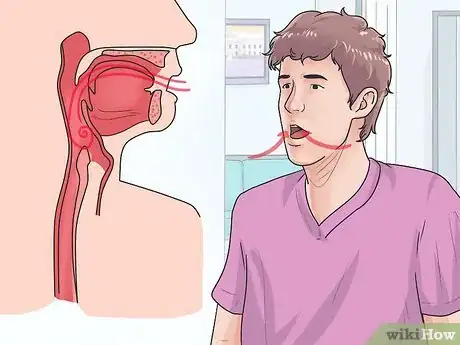

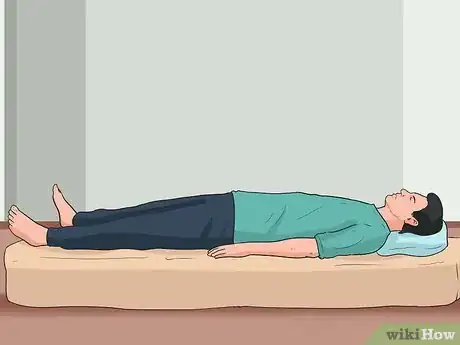
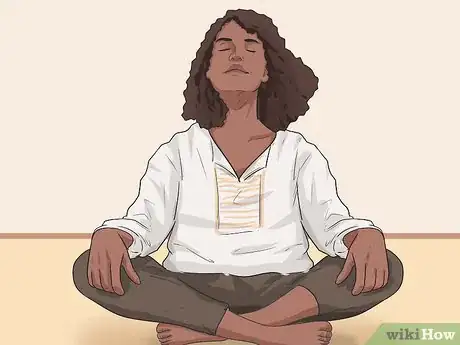
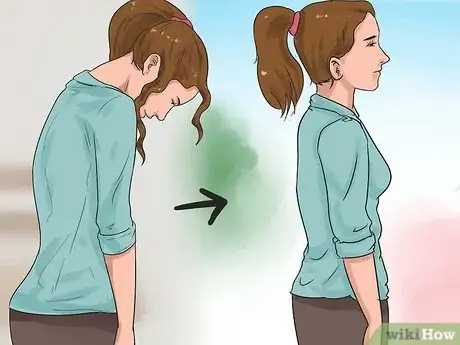
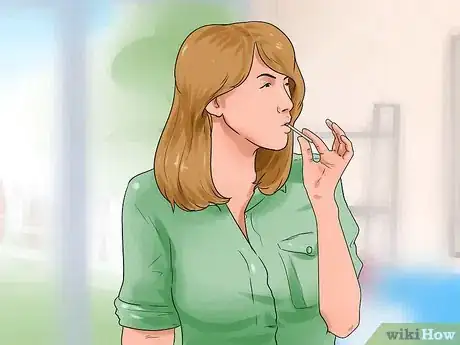

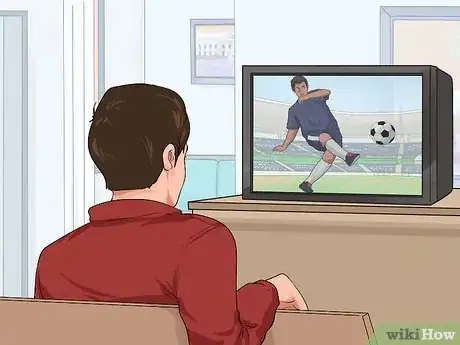
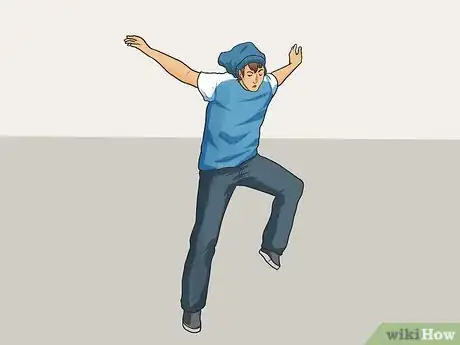
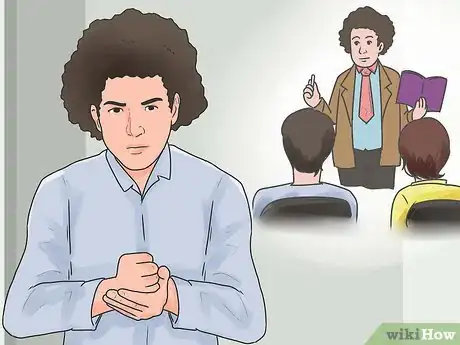
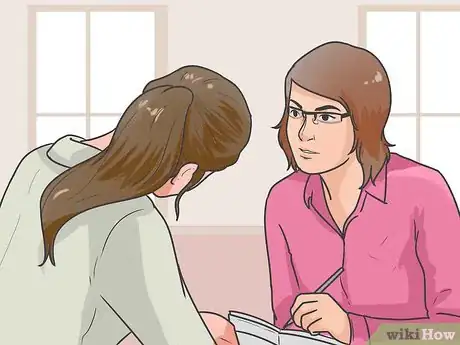
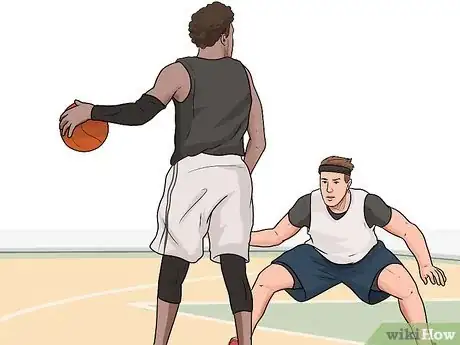
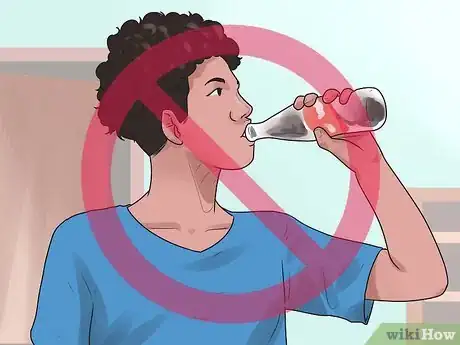

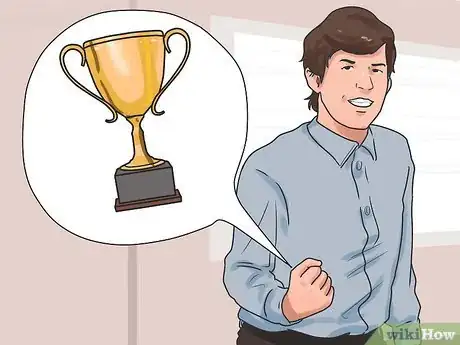
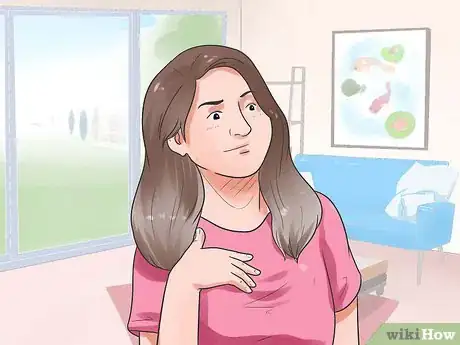
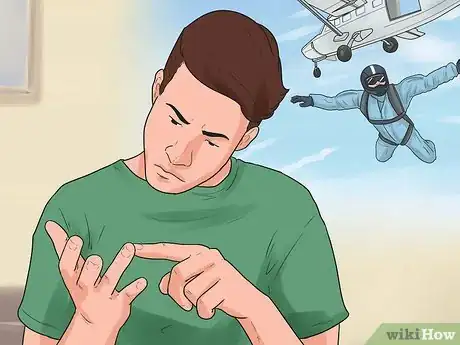
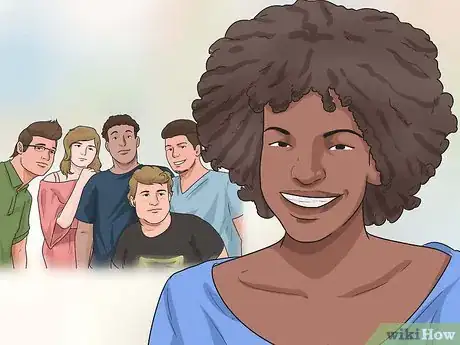




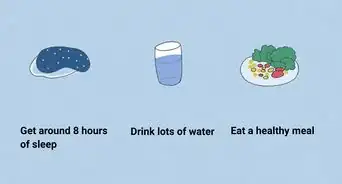
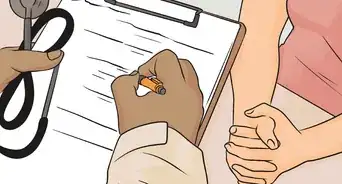
























































Medical Disclaimer
The content of this article is not intended to be a substitute for professional medical advice, examination, diagnosis, or treatment. You should always contact your doctor or other qualified healthcare professional before starting, changing, or stopping any kind of health treatment.
Read More...